
The Metropolitan Borough of Rotherham is a metropolitan borough of South Yorkshire, England. It is named after its largest town, Rotherham, but also spans the outlying towns of Maltby, Swinton, Wath-upon-Dearne, Dinnington and also the villages of Rawmarsh and Laughton. A large valley also spans the entire borough. Locally known as the Rother Valley.

Wentworth was a parliamentary constituency in South Yorkshire. Originally created in 1918 and was abolished in 1950, the name was revived when a new constituency was created from 1983 to 2010. Throughout its history, Wentworth was a safe seat for the Labour Party.

Wath upon Dearne is a town south of the River Dearne in the Metropolitan Borough of Rotherham, South Yorkshire, England, 5 miles (8 km) north of Rotherham and almost midway between Barnsley and Doncaster. It had a population of 11,816 at the 2011 census. It is twinned with Saint-Jean-de-Bournay in France.
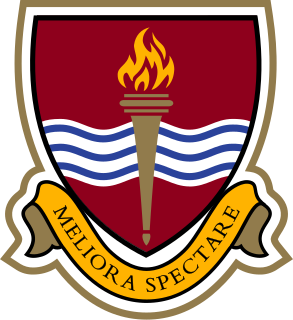
Wath Academy is a mixed secondary school on Sandygate in Wath-upon-Dearne in the Metropolitan Borough of Rotherham, South Yorkshire, England.
Dearne Valley College is a further education college situated in the Manvers Park area of Wath-upon-Dearne, in the Metropolitan Borough of Rotherham, South Yorkshire, England. It also has a campus near Wath-upon-Dearne town centre.
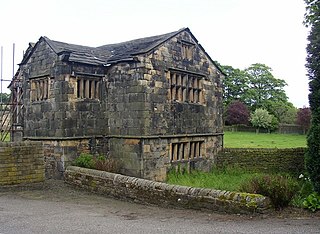
Kirklees Priory was a Cistercian nunnery whose site is in the present-day Kirklees Park, Clifton near Brighouse, Calderdale, West Yorkshire, England. It was originally in the ancient ecclesiastical parish of Dewsbury. The priory dedicated to the Virgin Mary and St James was founded by Reiner le Fleming, Lord of the manor of Wath upon Dearne, in 1155 during the reign of Henry II.
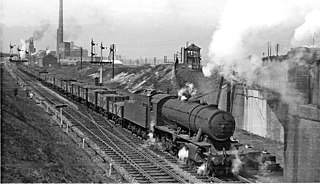
Manvers Main Colliery was a coal mine, sunk on land belonging to the Earl Manvers on the northern edge of Wath-upon-Dearne, between that town and Mexborough in the Dearne Valley, in the West Riding of Yorkshire, England. The regional headquarters and laboratories of British Coal were situated in the complex.

Acton Town Hall is a municipal building in High Street, Acton, London. It is a Grade II listed building.
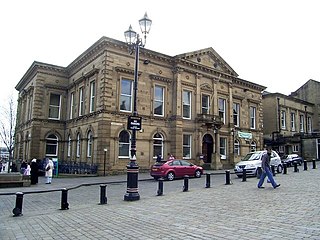
Batley Town Hall is a municipal facility in the Market Place in Batley, West Yorkshire, England. It is a Grade II listed building.

Cleckheaton Town Hall is a municipal building in Bradford Road, Cleckheaton, West Yorkshire, England. The town hall, which was the headquarters of Spenborough Urban District Council, is a Grade II listed building.

Sale Town Hall is a municipal building in School Road, Sale, Greater Manchester, England. The town hall was the headquarters of Sale Borough Council until the council was abolished in 1974.
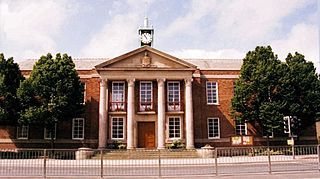
Padiham Town Hall is a municipal building in Burnley Road, Padiham, Lancashire, England. The town hall, which was the headquarters of Padiham Urban District Council, is a grade II listed building.

Hitchin Town Hall is a municipal structure in Brand Street, Hitchin, Hertfordshire, England. The town hall, which was the headquarters of Hitchin Urban District Council, is a Grade II listed building.

Letchworth Town Hall is a municipal building in Broadway, Letchworth, Hertfordshire, England. The town hall, which was the headquarters of Letchworth Urban District Council, is a Grade II listed building.
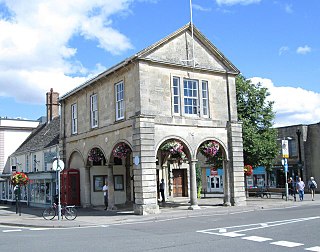
Witney Town Hall is a municipal structure in Spring Lane in Market Square, Witney, Oxfordshire, England. The town hall, which is the headquarters of Witney Town Council, is a Grade II* listed building.

Pontypool Town Hall is a municipal structure in Hanbury Road, Pontypool, Wales. The town hall, which forms the original part of a civic centre that now serves as the headquarters of Torfaen County Borough Council, is a Grade II listed building.
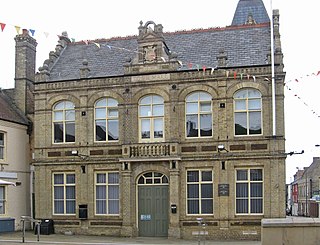
Downham Market Town Hall is a municipal building in Bridge Street, Downham Market, Norfolk, England. The structure, which is managed by Downham Market Town Council, is a Grade II listed building.
Wath upon Dearne is a town in the Metropolitan Borough of Rotherham, South Yorkshire, England. The town and surrounding area contain 15 listed buildings that are recorded in the National Heritage List for England. Of these, one is listed at Grade I, the highest of the three grades, and the others are at Grade II, the lowest grade. The listed buildings include houses, farmhouses and farm buildings, a church, a former town hall, a public house, a former smithy, a former lock-up, and a mausoleum.

Rugeley Town Hall was a municipal building in the Market Square in Rugeley, Staffordshire, England. The building, which was the headquarters of Rugeley Urban District Council, was demolished in 1978.


















